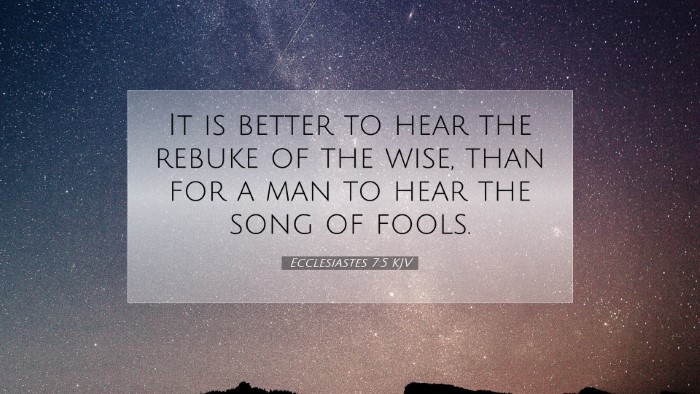Ecclesiastes 7:5 Commentary
Verse: "It is better to hear the rebuke of the wise than for a man to hear the song of fools."
Introduction
The book of Ecclesiastes presents a unique perspective on life, embracing the concept of wisdom and folly through various observations of the human experience. In chapter 7, verse 5, Solomon emphasizes the value of receiving wise counsel over succumbing to the fleeting pleasures of folly. This commentary synthesizes insights from public domain sources, offering a meaningful analysis for readers seeking depth in this passage.
Contextual Analysis
Ecclesiastes is a reflective work attributed to Solomon, grappling with the meaning and purpose of life. In this chapter, Solomon juxtaposes wisdom and folly—two concepts critical throughout the text. The setting for this verse suggests a practical approach to wisdom: one that prioritizes acknowledgment of faults and a willingness to grow over the superficial joys offered by foolishness.
Insights from Commentators
- Matthew Henry:
Henry highlights the moral superiority of receiving correction. He notes that wiser people often admonish us for our errors, and this rebuke serves both as a means to prevent further missteps and as a source of growth. The wise use their knowledge and experiences to guide others toward righteousness, making their admonitions valuable.
- Albert Barnes:
Barnes contrasts the fleeting nature of the "song of fools" with the lasting impact of wise rebuke. He suggests that while the songs of fools may be enjoyable and easy, they lack the substance necessary for forming a virtuous life. Such songs lead to complacency and can mislead, whereas the rebuke of the wise might be painful but is ultimately constructive.
- Adam Clarke:
Clarke furthers this line of thought, suggesting that rebuke from wise individuals often comes with the intention of improvement and discipline. He emphasizes the importance of discernment in recognizing who the ‘wise’ are—individuals whose insights are rooted in an understanding of God’s truth. Listening to their rebuke, therefore, is an act of humility that leads to spiritual growth.
Theological Implications
This verse raises significant theological questions about wisdom, correction, and human behavior. The preference for the rebuke of the wise illustrates God's design for communal growth through accountability. It exhibits a relational aspect of faith, emphasizing that community and correction are vital to spiritual development.
Wisdom and Folly
In the Biblical narrative, wisdom is often personified and praised, while folly is consistently depicted as a destructive force. Ecclesiastes 7:5 encapsulates this dichotomy, encouraging believers to embrace wisdom as a guiding principle. The verse underscores the idea that wisdom is a profound treasure; being able to discern wise counsel from foolish entertainment is essential for spiritual maturity.
The Role of Rebuke
Rebukes serve as instruments of grace. They remind believers of their shortcomings and guide them back to a righteous path. This passage encourages pastors and spiritual leaders to embrace the difficult role of offering correction with love and reverence, ensuring their community thrives in truth rather than mere comfort.
Reception of Rebuke
How one receives rebuke may define their spiritual trajectory. A humble heart recognizes the need for correction while a prideful one dismisses wise counsel. This passage invites introspection on our own attitudes toward advice. It urges one to cultivate a spirit receptive to the truth, understanding that such truths may sometimes be uncomfortable but are necessary for growth.
Practical Applications
For pastors and theologians, Ecclesiastes 7:5 holds practical implications for both ministry and personal life:
- Embrace Correction: Recognize that correction is an opportunity for growth. Create environments where rebuke is shared in love.
- Value Wise Counsel: Seek out and prioritize the voices of those who embody wisdom and godliness in your life.
- Encourage Open Dialogue: Foster a community where honest conversation is welcomed, allowing space for feedback and correction.
- Reflect on Identity: Consider what role you play in offering rebuke. Are you a wise counselor, or do you tend to indulge in folly?
Conclusion
Ecclesiastes 7:5 profoundly challenges the reader to consider the choice between wise correction and the allure of folly. By prioritizing the counsel of the wise, believers can navigate life’s complexities with morality and clarity. As we heed Solomon's instruction, we align ourselves closer to God’s heart, finding that true wisdom often comes in the form of loving correction.


